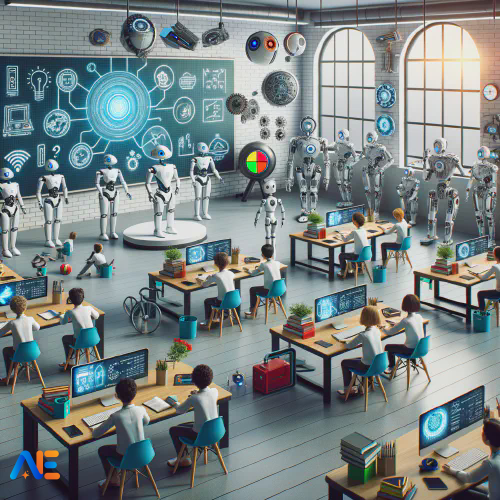
As someone who has spent a significant amount of time working with both AI and teaching, I’ve come to appreciate the importance of preparing our students for a future where automation and AI will be commonplace. This post aims to provide teachers with practical advice on how to incorporate lessons about these technologies into their curriculum, even if they are not tech-savvy themselves.
Introduction to Automation and AI
Before we delve into the specifics, it’s important to understand what we mean by automation and AI. In simple terms, automation refers to the use of technology to perform tasks without human intervention, while AI, or artificial intelligence, is a branch of computer science that aims to create machines that mimic human intelligence.
Why Teach About Automation and AI?
The world is changing rapidly, and these technologies are at the forefront of that change. They are already transforming industries, from manufacturing to healthcare, and their influence is only set to grow. By teaching students about automation and AI, we are equipping them with the knowledge they need to navigate this new landscape, whether they end up working in these fields or simply living in a world shaped by them.
Incorporating Automation and AI into the Curriculum
Understanding the Basics
The first step in teaching students about automation and AI is to help them understand the basics. This doesn’t mean they need to become coding experts, but they should have a general understanding of how these technologies work. For example, you might explain that AI involves creating algorithms, which are sets of instructions that tell a computer what to do. You could also discuss the concept of machine learning, where computers learn from data without being explicitly programmed.
Discussing the Ethics of AI
As with any powerful technology, AI and automation come with ethical considerations. It’s important to discuss these with students to help them understand the potential implications of these technologies. For example, you might discuss issues of privacy and data security, or the ethical dilemmas posed by autonomous vehicles. Encouraging students to think critically about these issues will not only deepen their understanding of the technology but also help them become more informed and ethical citizens.
Exploring the Impact on Jobs
One of the most tangible ways that automation and AI are likely to affect students is through their impact on the job market. Some jobs may become automated, while new jobs may be created that we can’t even imagine yet. Discussing these possibilities with students can help them prepare for the future and think strategically about their career paths.
Practical Tips for Teaching About Automation and AI
Use Real-World Examples
One of the best ways to make these concepts accessible to students is to use real-world examples. For instance, you might discuss how AI is used in recommendation algorithms on streaming services, or how automation is used in self-checkout machines at the supermarket.
Incorporate Hands-On Learning
If possible, incorporate hands-on learning experiences. This could be as simple as using online tools that introduce basic coding concepts, or as advanced as having students design their own simple AI algorithms.
Encourage Exploration
Finally, encourage students to explore these topics on their own. There are many resources available online, from articles and videos to interactive tutorials, that can help students delve deeper into these subjects.
Conclusion
In conclusion, teaching students about automation and AI is not just about preparing them for the job market. It’s about equipping them with the knowledge and skills they need to navigate a rapidly changing world. By incorporating lessons about these technologies into your curriculum, you can help students understand the basics of how these technologies work, grapple with the ethical implications, and prepare for the potential impacts on their future careers.